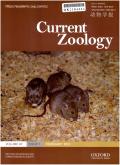Early life food-intake modulates effects of diet restriction on lifespan and fecundity in later life in a predatory mite (Acari: Phytoseiidae)
IF 2
2区 生物学
Q2 ZOOLOGY
引用次数: 0
Abstract
The nutritional status of an individual can significantly influence its life history traits, including development, growth, reproduction, and survival. In the predatory mite Phytoseiulus persimilis Athias-Henriot (Acari: Phytoseiidae), the plasticity of life history traits, such as developmental time and size at maturity, is influenced by the quality and quantity of food. This study aimed to investigate the effects of dietary restriction at different life stages (i.e., juvenile, early adulthood, and later adulthood) on the lifespan and fecundity of P. persimilis. We found that reduced dietary intake during early adulthood resulted in a shorter lifespan for both male and female P. persimilis. Furthermore, this study demonstrated a sex-specific response to dietary restriction: it extended the lifespan of males but reduced that of females during later adulthood. Diet restriction during the post-ovipositional period of females showed the most variable life history trait response. Our results showed that the impact of diet restriction at different life stages can have combined influences on the post-ovipositional duration of P. persimilis, where the individuals receiving diet restriction during immature development and early adulthood had a greater reduction in ovipositional duration as those experiencing diet restriction during late adulthood. Additionally, we observed a positive correlation between the lifespan and fecundity of females, with higher prey availability increasing both. The insights obtained from our research contribute to a better understanding of the aging process and dietary requirements of P. persimilis, which can facilitate the development of more effective biological control strategies using this predator for spider mites in agriculture.捕食螨(螨科:Phytoseiidae)生命早期的食物摄入调节饮食限制对其生命后期寿命和繁殖力的影响
个体的营养状况会极大地影响其生活史特征,包括发育、生长、繁殖和存活。在捕食螨Phytoseiulus persimilis Athias-Henriot(Acari:Phytoseiidae)中,发育时间和成熟时的大小等生活史性状的可塑性受到食物质量和数量的影响。本研究旨在探讨在不同生命阶段(即幼年、成年早期和成年晚期)限制饮食对P. persimilis寿命和繁殖力的影响。我们发现,成年早期饮食摄入量的减少会导致雄性和雌性持久性有机污染物的寿命缩短。此外,这项研究还证明了饮食限制的性别特异性反应:在成年后期,饮食限制延长了雄性的寿命,但却缩短了雌性的寿命。雌性在移居后期间的饮食限制表现出最多变的生活史性状反应。我们的研究结果表明,不同生命阶段的饮食限制会对持久性有机污染物的排卵后持续时间产生综合影响,在未成熟发育期和成年早期接受饮食限制的个体与在成年晚期接受饮食限制的个体相比,排卵持续时间的缩短幅度更大。此外,我们还观察到雌性个体的寿命和繁殖力之间存在正相关关系,猎物的可获得性越高,两者的寿命和繁殖力就越长。我们的研究有助于更好地了解持久性蛛螨的衰老过程和对食物的需求,这将有助于制定更有效的生物控制策略,利用这种捕食者来控制农业中的蛛螨。
本文章由计算机程序翻译,如有差异,请以英文原文为准。
求助全文
约1分钟内获得全文
求助全文
来源期刊

Current Zoology
Agricultural and Biological Sciences-Animal Science and Zoology
CiteScore
3.20
自引率
9.10%
发文量
111
审稿时长
6 weeks
期刊介绍:
About the Journal
Current Zoology (formerly Acta Zoologica Sinica, founded in 1935) is an open access, bimonthly, peer-reviewed international journal of zoology. It publishes review articles and research papers in the fields of ecology, evolution and behaviour.
Current Zoology is sponsored by Institute of Zoology, Chinese Academy of Sciences, along with the China Zoological Society.
 求助内容:
求助内容: 应助结果提醒方式:
应助结果提醒方式:


